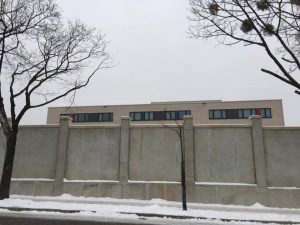
Detention for the purpose of deportation is the most rigorous instrument to “ensure deportation” whenever people are obligated to leave under the threat of enforcement. Federal police respectively foreigners’ department will have come to the impression that the person wants to actively avoid deportation. Detention is applied whenever deportation is ordered to the country of origin or to another EU-member state according to Dublin III regulation. Since detention is the strongest enforcement of a measure against the will of an individual, a judge needs to order it. For that, foreigners’ departments and federal police issue according requests at the responsible district courts. Detention for the purpose of deportation is regulated in §62 Residence Law. Saxony detained 232 people in 2013 (source: dnn). The majority of people who were detained in Saxony were picked up by the police when they crossed the border to Germany without legal documents. Since they have no permanent residence, the authorities assumed that only by incarceration deportation can be ensured. Another reason for detention might be an expired residence title (e.g. in the case of a negative decision to a request for asylum) and the person affected not departing “voluntarily”. Until December 2013, Dresden prison had capacity for 24 men about to be deported in a regular jail. On the basis of EU return directive, issued in 2008 already, that practice was considered to be illegal. The directive orders a clear separation between prisoners who are there because of the Penal Code and those detained for their deportation. Sharp restriction of the conditions of detention were the result. Private mobile phones were prohibited, “leisure” time and visitor hours were limited. Ever since December 2013, detainees are incarcerated in the detention centers of Berlin Köpenick and Eisenhüttenstadt in Brandenburg. The leaflet “Defenseless behind Gates”, issued by PRO ASYL, gives an overview on the conditions of detention in German detention centers. The Refugee Councils of Brandenburg and Schleswig-Holstein as well as Humanistische Union explain facts and arguments in the leafleat “Detention without Crime”.
The most obvious difference is the detention period. Four days maximum when it comes to departure custody, until twelve months in the case of deportation detention (much longer in practice). Whereas deportation needs to be enforced soon in the case of custody, i.e. the foreigners’ department has organized documents, flights etc. already, this does not have to be so in the case of detention. A decision about deportation does not even have to be met (Preemptive detention). Otherwise one might be detained if he*she is forcibly obligated to emigrate, a deportation order according to §58a Residence Law was issued, the Foreigners’ Department could not find out the current address of the person affected, he*she prevented deportation by other means or danger of escape persists. In the case of custody, the obligations to cooperate must have been violated and deception on identity or citizenship must have taken place. The federal paragraph that enables custody, is itself a problematic one. §2 (14) of Residence Law defines what fugitive means. Whereas the regulations on detention refer to that definition, §62b on custody circumvents them. At least arbitrariness by authorities is something that needs to be calculated with.
On May 17th 2017, Saxon Parliament passed the law on the enforcement of custody in Saxony with the votes of CDU and SPD. It is a temporary law until a more comprehensive law will replace it. There, the enforcement of both detention for the purpose of deportation as well as custody for the purpose of departure will be regulated. An appeal that was sent to the Members of State Parliament not to vote for the law did not have any effect.
For the first time ever, Saxon wants to put people into custody for departure. Custody for the purpose of departure affects people who escaped and are about to be deported to exactly those countries, where they are under threat of persecution, hardships, discrimination as well as poverty caused by structural exclusion. The custody also enables the detention of beneficiaries of protection, of kids and sick people as well as families. The state government publicly declared that it intends to separate the latter if necessary. The Saxon state government does not have to apply the Federal Residence Law. By all means, the option exists to create political pressure together with the state governments of other federal states like Schleswig-Holstein or Rheinland-Pfalz. Those two states already declared that they want to get rid of the paragraphs that regulate detention, custody and their enforcement in Residence Law.
The realization of both instruments as it is intended in Saxon Law on the Enforcement of Custody Detention violates the UN-Convention on the Rights of the Child, the EU-return directive, German constitution and even German Residence Law. The law gets tightened ever faster and stricter, the demands from the political right are preemptively transformed into law before older laws can show effect even. Humanity cannot keep up with that kind of speed. The ultima ratio detention for deportation as well as custody for deportation are made legal, milder alternatives such as close and individual case management are not considered. We appeal to the representatives of Saxon Parliament to reject the Saxon Law on the Enforcement of Custody when it is voted upon. By this, the crossing of even more moral and legal lines in Saxony would be prevented.
Our critique and demands base on the following points:
-
Substantial doubts have been raised concerning the ever tighter asylum laws that were passed ever since 2015. Instead of enforcing those laws on the state level, holders of political office should aim for judicial review of those laws by the Supreme Court. In this sense, the enforcement of custody in Saxony shall be avoided.
-
The visitors’ rights of families and friends, lawyers and NGOs need to be granted and actually implemented in practice.
-
The Penal Procedure Code only applies to criminals. The people that are affected here never committed a crime. Such a general reference to the Penal Procedure Code, as it is found in this law, is highly problematic. The reasons for that are to be found in numerous points: the general reference misappropriates the necessity for social advice, for psychosocial and psychotherapeutic offers, rights of vulnerable persons as well as the right to privacy of correspondence and telecommunication. The custody is about to become to an absolute “Blackbox”. At least eight suicide attempts in German detention centers ever since 2012 show the need for outmost sensitivity and the importance of transparency. We remind that the people affected are about to be deported. Re-traumatizations under this conditions of detention are very likely.
-
The administration courts need to be included much more in the review for the reasons for arrest. The open question on pending procedures needs to be clarified. Administration of justice needs to present at all times.
-
By incarcerating minors, Saxony will violate the UN-Convention on the Rights of the Child. The kids will not be able to fulfill their constitutional obligation to go to school. Again, article 6 is relativised by the state government. The separation of families is expanded by another instrument.
A change request of CDU and SPD aimed to “improve” conditions in custody. That was supposed to look like that:
- The proposed change of law claims that particular attention will be paid to the situation and needs of people in need of protection”. There is no definition of what that is supposed to be.
- Families as well as unaccompanied minors are supposed to be incarcerated separately. Which does not change the fact that families and unaccompanied minors will be incarcerated.
- An advisory board that includes two representatives of civil society is supposed to guarantee control and transparency. An unrestricted right for lawyers and NGO-employees was not regulated here.

Custody not only means the restriction of human rights – human rights are violated.
The whole appeal can be found here. It was sent via E-Mail to the Members of Saxon Parliament as well as to the Saxon Members of German Bundestag to their knowledge. A short problematization of the change request can be found here.


